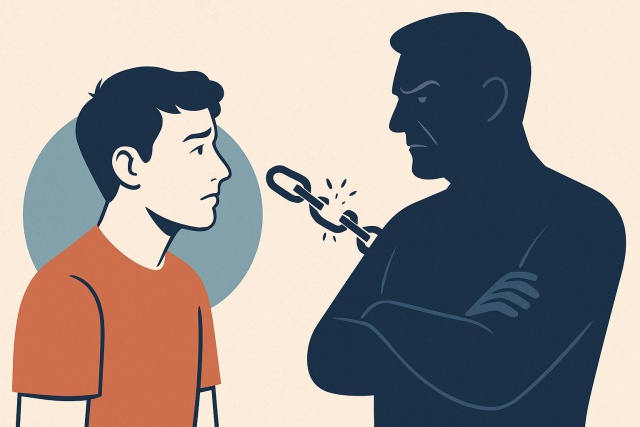
How to Talk to a Narcissist Without Losing Yourself
Discover practical, step-by-step strategies to communicate with narcissists confidently without sacr...
Getting a grip on a father's role in family dynamics is important, particularly when understanding the specific narcissistic father traits that can emerge. When narcissism enters the picture, it casts a long shadow over relationships and the emotional well-being of everyone involved.
Narcissism often gets tossed around as just vanity or arrogance but when it creeps into family life it usually reveals a steady pattern of being overly self-absorbed. A narcissistic father tends to carry a sense of grandiosity and often struggles to genuinely empathize with his family. He has an almost relentless need to control and dominate how things run at home, always putting his own needs before everyone else’s.
It’s important to spot the difference between healthy self-esteem and pathological narcissism, especially with fathers. Healthy self-esteem means having genuine confidence and respecting yourself and those around you. Pathological narcissism involves an inflated sense of superiority and entitlement that can quietly or loudly wreck relationships. When dads fall into this trap, their behaviors often undermine their children’s emotional safety instead of nurturing growth and independence.
Narcissistic fathers often display behaviors that can throw a wrench into family life. These traits range from blunt demands for admiration to quieter sneaky forms of emotional neglect that can leave you wondering what just happened.
These traits tend to pop up in everyday family moments and sometimes catch you off guard. Take a dad who might quickly jump in to cut off or correct a child’s feelings during a conversation. He might expect a round of applause at family gatherings or make decisions that throw a wrench into family plans without a heads-up. Sure, these behaviors might seem par for the course in a strict parenting style. But more often they come across as lacking empathy and stir up fear or resentment rather than genuine respect.
Traits of a narcissistic father often set the tone for the emotional climate at home and influence how family members talk to each other and the roles they end up playing. More often than not this stirs up tension, leads to misunderstandings and creates unhealthy dynamics.
In these settings family roles often get set in stone. For example, one child might naturally fall into the caretaker or "golden child" spot while another unintentionally becomes the scapegoat. These patterns usually nudge kids toward coping strategies like people-pleasing, bottling up emotions or acting out to keep their feelings in check.
"Children who grow up with narcissistic fathers often end up carrying emotional scars that quietly shape their self-esteem and the way they build relationships long after childhood has passed. From what I have seen, a good dose of understanding and a sprinkle of empathy are absolutely key to breaking out of this tough cycle."
Boundaries serve as the quiet sentinels of our emotional and physical space, gently keeping things in check. On the flip side, codependency often sneaks in as an unhealthy craving for someone else's approval or control.
Codependency often sneaks in when family members start putting the narcissistic father's emotional needs and demands before their own well-being, sometimes without even realizing it. Personal boundaries get blurred or ignored like a worn-out fence that no longer keeps things where they should be.
The first vital step is spotting when boundaries have been crossed—something that’s easier said than done. Once that’s clear, families can begin setting limits by laying them out calmly and clearly and then sticking to those boundaries with follow-through consequences if they’re ignored.
Children who grow up with narcissistic fathers often carry long-term psychological and emotional struggles that stick around like an unwelcome guest. These challenges chip away at their confidence and complicate relationships and their sense of self well into adulthood.
Growing awareness and easier access to therapy allow a lot of people to finally tackle these patterns head-on.

Recovering from the impact of a narcissistic father definitely takes serious effort and the right kind of support plus a good dose of self-care. Family members often find their way forward by reaching out for professional counseling, connecting with communities that understand what they’re going through and picking up knowledge about healthy relationship dynamics along the way.
Recovery from the effects of narcissistic father traits rarely happens quickly or in a straight line. It demands patience and steady, sometimes stubborn effort.

Discover practical, step-by-step strategies to communicate with narcissists confidently without sacr...

Discover the 7 critical signs of a narcissistic father and how understanding these behaviors empower...

Spotting the signs of a toxic relationship early can save your emotional health. Discover key red fl...

Stalking personality traits often mask complex psychological issues. This guide helps therapists rec...